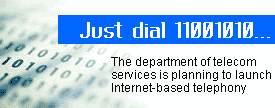

|
|
|
|
| HOME | INFOTECH | HEADLINES | |||
|
November 27, 1999
HEADLINES
|

Neena Haridas The department of telecom services is planning to launch Internet-based telephony in the country. This is perhaps the first stage in the grand plan of Minister for Telecommunication Ram Vilas Paswan to increase telephone density in rural areas from 0.6 per 100 to four per 100 by 2010, and to 15 per 100 by 2010 in the urban areas.
IP telephony is different from the software commonly used by web surfers like Net2Phone. While IP telephony relies on new and modified Internet technology, giving it an edge over currently available software that is badly constrained by the limitations of bandwidth and hardware. IP telephony's main attraction is that it's far cheaper than conventional telephone services. According to some estimates, it is 75 per cent cheaper to use IP telephony than a telephone using conventional analogue technology in rural areas. But the government is yet to fix the tariff. A conventional rural telephone costs anywhere between Rs 150,000 and Rs 200,000, says a member of the government's IT task force. Private operators are unhappy that the government's telecom policy does not permit private operators to offer IP telephony services. It may be recalled that the Department of Telecommunication had once opposed the introduction of IP telephony in the country arguing that the technology had not yet evolved and that the quality of voice through IP telephony was low. The DTS too admits IP telephony provides worse transmission than conventional telephony. But an official was quick to point out that "it is an emerging technology that should be tapped to fulfil the needs of a country as large as India. It is less expensive and, hence, it should be exploited." Says a private telecom operator who has interests in this area: "The government should allow private operators to provide IP telephone services and let the market decide its utility." It may be recalled that the IT task force set up by the prime minster also felt IP telephony should be considered as a possible alternative to reach rural areas since it was cheaper. The task-force had undertaken a project in the Warnanagar area of Kohlapur district in Maharashtra and had envisaged linking about 100 villages using the National Informatics Centre's network. According to Paswan, the DTS was committed to providing telephones on demand in all state capitals by March 31, 2000 and will connect all villages via telephone by 2002. Earlier this week Paswan had said the government was not able to provide village public telephones due to the lack of appropriate technology. The government has been able to provide telephone connections in only 3,000 villages of the targetted 45,000 villages, he said. Paswan had said that the DoT had formed a committee to pick technology right to provide villages with telephones. The report is expected in a month. Regarding the quality of the network, Paswan said the DTS would replace all electro-mechanical exchanges with electronic exchanges by January 2000. Andm, to streamline the billing system, the DTS would allow consumers to pay bills in nationalised banks. |
|
HOME |
NEWS |
BUSINESS |
SPORTS |
MOVIES |
CHAT |
INFOTECH |
TRAVEL |
SINGLES BOOK SHOP | MUSIC SHOP | GIFT SHOP | HOTEL RESERVATIONS | MONEY EDUCATION | PERSONAL HOMEPAGES | FREE EMAIL | FEEDBACK |